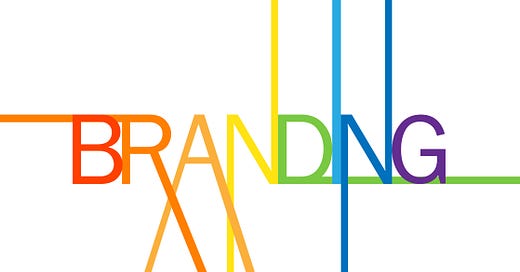Branding seems to come up more often lately. Google Trends shows that searches like “branding,” “branding strategies,” and “branding agencies” have reached peak popularity multiple times over the past 90 days.
Not that it ever went away, but some of the more creative aspects of marketing - like branding - have possibly been overshadowed in recent years by things like martech, marketing operations, lead generation.

Like other marketing terms, branding and its associated vernacular can be a little annoying. The term itself has a little bit of a hoity-toity connotation. Then you throw in words like brand drivers, the essence of a brand, the voice of a brand, and of course the question: but is that design/content/campaign “on brand”?
Also like many marketing concepts, there seems to be a divide. People either totally buy into the value of branding, or they think it’s bologna. I guess I should replace “people” with “companies.” Companies either invest in branding or they don’t. But people run companies, and the leaders within an organization - as well as their beliefs around branding - determine its role (or not) within a business.
Having worked with several brands over the years (and studied advanced branding) I’ve seen the power of it in action.
I believe that branding matters, but what’s behind the brand matters most.
In 2023, it’s harder to get away with a nice-looking-and-sounding brand that doesn’t have integrity and quality goods or services behind it. Social media, active empowered consumers, online reviews, and more make it harder to get away with faking it.
And why would you want to fake it? The joy in business is finding real solutions to real problems. The best brands are built based on products and services that solve real problems for people in their day-to-day lives.
I’m a brand believer and I’m about to tell you why.
Brands are bigger than a person, bigger than a company. A brand is a whole system that is much larger than a logo and a tagline. A brand is a universe made up of employees and the employee experience, customers and the customer experience, general public and their perception and experience of a brand, and more.
One of the strongest brands I’ve had the privilege to work with was during my time in a marketing role at the University of Cincinnati Lindner College of Business. Part of the secret behind the strength of the university’s brand is a sense of pride. I could see evidence of it on campus and out in the world among community members, students, employees, and alumni - people were (are) very proud to be affiliated with the college.
What I learned is that pride is such a strong catalyst for building something great.
The college also offers a lot to be proud of, including the fact that students who graduate get jobs thanks in part to the co-op program and great career services. In other words, they deliver on their brand promise and provide real value. The success of students further fuels the sense of pride for everyone in the college community.
Strong brands are driven by ideals that motivate and inspire. They are grounded in integrity and established by delivering products and services that help people - whether that help comes in the form of an education that leads to a job, professional services, software products, or something else.
I love this quote by Brene Brown:
“We love to believe we are rational, thinking people who, on occasion, feel some emotion. Everything we know about who we are as people neurobiologically points to one thing and that is we are emotional, feeling beings who on occasion think.”
The fact that we are emotional beings gets buried at work sometimes, where we’re mostly paid to think or do - not to feel. Which is funny in a way because no one ever starts a new business because of lackluster lukewarm feelings they have about the work they’re doing. At least not usually. It’s because they have passion for the work, or a passion for the life they’re building alongside the business.
Branding is one avenue for showcasing the heart of why a business exists as well as the emotional benefit the company provides to its customers. Branding is a mechanism for creatively conveying your company’s identity - including the value you offer, why you do it, and who benefits.
In the next newsletter I’ll share tactical ideas for creating (or updating) a brand that is aligned with your business and that serves as a tool for driving results, while also being a creative outlet for how people interact with your organization.




